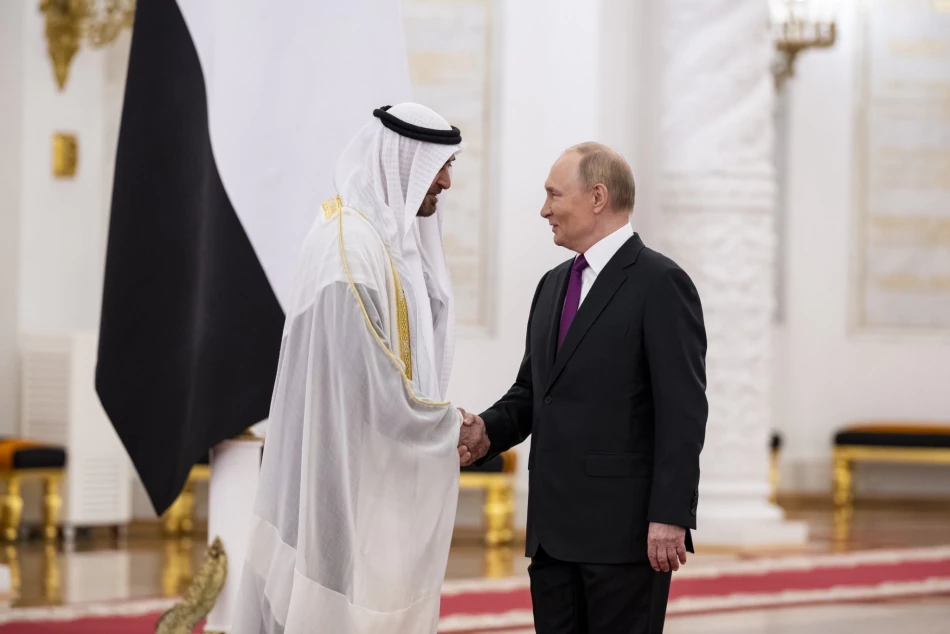
UAE President and Russian Leader Discuss Strengthening Strategic Partnership in Moscow
UAE-Russia Economic Ties Deepen as Bilateral Trade Agreement Signals Strategic Pivot
The United Arab Emirates and Russia have signed a comprehensive services and investment trade agreement during President Sheikh Mohammed bin Zayed's official visit to Moscow, marking another significant step in the Gulf state's strategy to diversify economic partnerships while maintaining its role as a neutral mediator in global conflicts. The deal comes as both nations seek to strengthen ties amid shifting geopolitical dynamics and Western sanctions on Russia.
Strategic Partnership Expands Beyond Energy
During talks at the Kremlin, Sheikh Mohammed bin Zayed and President Vladimir Putin reviewed cooperation across multiple sectors including space, technology, healthcare, transport, and logistics. The newly signed agreement complements the existing UAE-Eurasian Economic Union partnership, which includes Armenia, Belarus, Kazakhstan, and Kyrgyzstan alongside Russia.
This bilateral framework specifically targets high-value sectors such as fintech and professional services, areas where the UAE has established itself as a regional hub. For Russian businesses facing Western restrictions, the UAE's advanced financial infrastructure and regulatory environment offer alternative pathways for international commerce.
UAE's Calculated Neutrality Pays Dividends
The timing of this agreement reflects the UAE's sophisticated approach to international relations. While Western nations have imposed extensive sanctions on Russia following its invasion of Ukraine, the Emirates has maintained diplomatic and economic engagement with Moscow while simultaneously facilitating prisoner exchanges between Russia and Ukraine—a humanitarian effort involving over 4,000 prisoners that Putin specifically acknowledged during the talks.
This balanced approach mirrors strategies employed by other regional powers like Turkey and India, which have leveraged their neutral positions to expand trade relationships with Russia while avoiding direct confrontation with Western allies.
Economic Implications for Both Nations
For the UAE, deeper Russian ties offer access to energy resources, agricultural products, and technology sectors where Russia maintains competitive advantages despite sanctions. The agreement also positions Dubai and Abu Dhabi as key intermediaries for Russian businesses seeking global market access through compliant channels.
Russia benefits from the UAE's status as a major financial center and its extensive trade networks across Asia, Africa, and beyond. The partnership provides Moscow with alternative payment systems and investment flows as traditional Western financial channels remain restricted.
Regional Dynamics and Future Summit
Both leaders emphasized the importance of the upcoming Arab-Russian summit scheduled for October, an initiative that signals Russia's broader strategy to strengthen ties with the Arab world as it seeks to reduce dependence on Western partnerships. This summit could establish new frameworks for energy cooperation, technology transfer, and investment flows between Russia and Arab nations.
The discussions also covered Middle East developments, with both leaders advocating for a two-state solution to the Israeli-Palestinian conflict—a position that aligns the UAE's recent diplomatic initiatives with Russia's traditional stance on the issue.
Market and Investment Perspective
From an investor standpoint, this agreement opens new opportunities in sectors where both nations have complementary strengths. Russian expertise in space technology, nuclear energy, and cybersecurity could find new applications in the UAE's ambitious development projects, while Emirati investment capital and business networks provide Russian companies with alternative growth pathways.
The transport cooperation memorandum signed between the two nations' infrastructure ministers suggests potential for significant logistics projects, possibly including overland routes that could reshape regional trade flows and reduce dependence on traditional maritime channels.
This partnership demonstrates how middle powers can navigate complex geopolitical environments by maintaining strategic autonomy while building mutually beneficial economic relationships, regardless of broader international tensions.
Most Viewed News

 Sara Khaled
Sara Khaled






